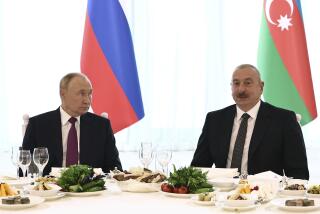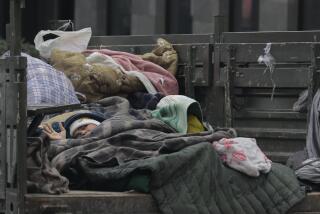No Troop Pullout From Azerbaijan, Kremlin Official Indicates : Soviet Union: Moscow is willing to talk. But it wants to ‘consolidate the situation.’
- Share via
MOSCOW — A senior Kremlin official indicated Tuesday that while Moscow is willing to negotiate with “moderate” members of the Azerbaijani Popular Front, it is not ready to meet the main Azerbaijani demand and pull its troops out of the southern republic.
Returning from a three-week trouble-shooting mission to the strife-torn republic, Vyacheslav A. Mikhailov, acting head of the Communist Party leadership’s nationalities department, told a news conference that Popular Front militants bear full responsibility for the violence. At least 125 people have been killed since Jan. 20, when the army was sent to enforce a state of emergency in Baku, the Azerbaijani capital.
Mikhailov acknowledged that the troops can only maintain law and order, not secure real political stability. And he said the authorities are “now discussing how to proceed with the Azerbaijani Popular Front.”
However, he said, “it is necessary to consolidate the situation, and then the moderates of the Azerbaijani Popular Front must dissociate themselves from the extremists.”
The front, which emerged last year as a major political force in Azerbaijan, said over the weekend that it was ready to work with Soviet officials to restore order if Moscow lifted the state of emergency and withdraws its forces.
The army was sent to Baku following several days of bloody pogroms aimed at Azerbaijan’s Armenian minority. At least 72 people had been killed at that point.
There is ancient bitterness between Azerbaijanis, most of whom are Muslims, and Christian Armenians, most of whom live in the neighboring Soviet republic of Armenia. Both peoples have been upset at Moscow for what each sees as the favoritism the Kremlin shows toward the other. These feelings have become particularly strong in connection with the dispute over Nagorno-Karabakh, an Armenian enclave administered by Azerbaijan.
Moscow’s declaration of virtual martial law in Baku infuriated the Azerbaijanis and greatly deepened the political threat to President Mikhail S. Gorbachev.
Indicative of the potential international ramifications of the situation, Soviet television reported Tuesday night that 363 people have been detained on the border between Azerbaijan and neighboring Iran, which has a large Azerbaijani minority. Of those detained, 255, including two reputed representatives of the Popular Front, were said to be trying to flee into Iran, and 108 were going the other way.
The period of time in which the detentions were carried out was not clear from the broadcast.
Mikhailov, the Communist Party official, spoke to journalists here on the eve of an unprecedented effort by independent political groups in the Baltic Soviet republics to mediate the differences between Azerbaijan and Armenia.
Leaders of the Azerbaijani Popular Front and the Armenian All-National Movement are to meet today and Thursday in Riga, the capital of Latvia, under the auspices of the Baltic Council. If these independent movements succeed where Communist authorities have failed, it could give them an enormous boost in their drive for greater political power.
Mikhailov criticized former leaders of the Azerbaijani Communist Party for their “procrastination” in dealing with growing tension in the republic and for failing to “isolate extremists” before the state of emergency was declared. He said that “everything will now depend on the viability and political activity” of the new party leadership named a week ago.
Mikhailov dismissed suggestions, originally made by Gorbachev, that the situation in the republic is taking on a strong Islamic character. While there are attempts to link the Azerbaijani Popular Front with the broader Islamic movement in Iran and elsewhere, he said “there is not a solid base for the development of these ideas in Azerbaijan.”
Soviet news reports depicted the situation in Azerbaijan as slowly returning to normal Tuesday. According to these reports, 80% of the business enterprises in Baku and several other cities are open after strikes had brought the economy to a virtual standstill.
Azerbaijanis reportedly turned in hundreds of weapons, including machine guns and a grenade launcher. The state airline Aeroflot reported that 2,600 Russians who had been about to flee the region returned their airline tickets.
More to Read
Sign up for Essential California
The most important California stories and recommendations in your inbox every morning.
You may occasionally receive promotional content from the Los Angeles Times.













